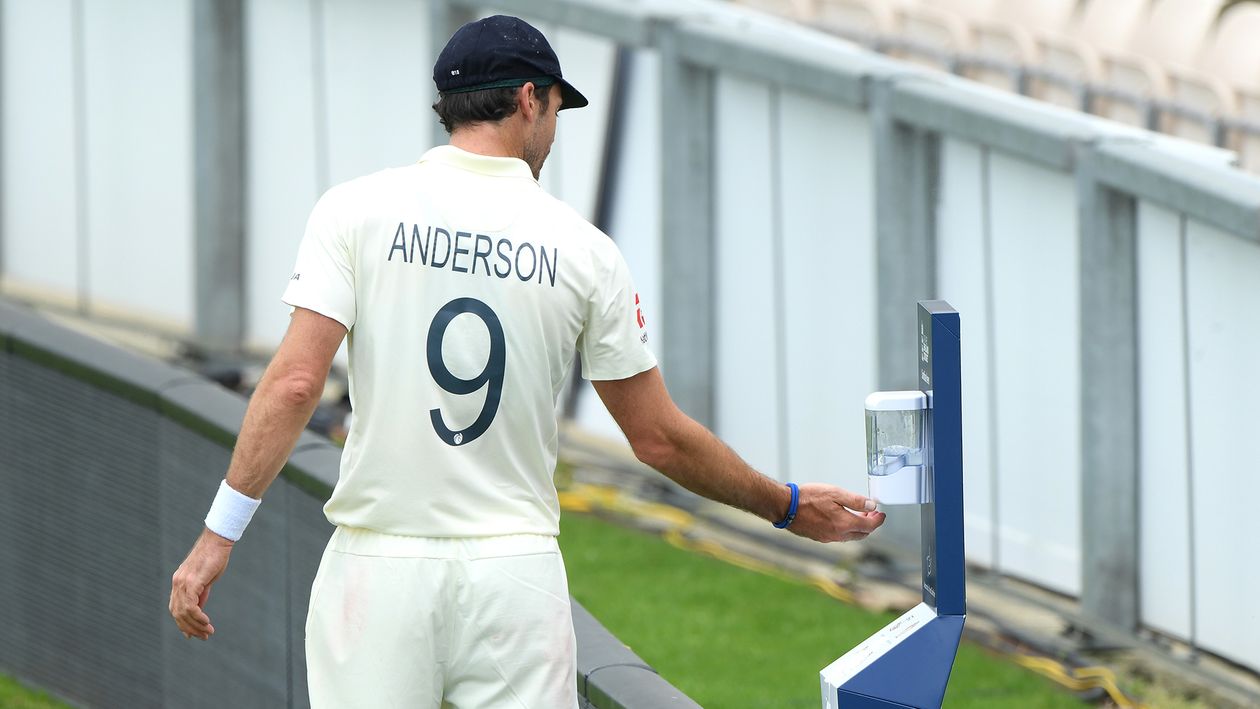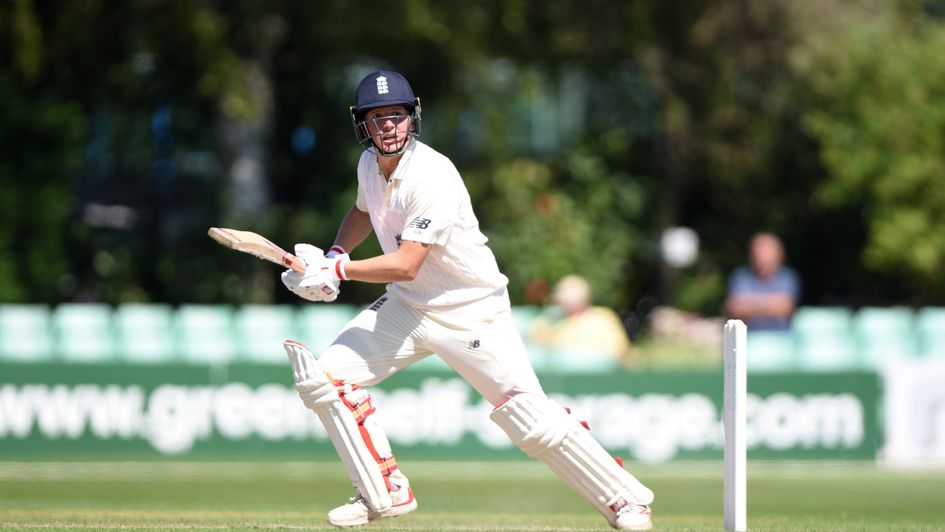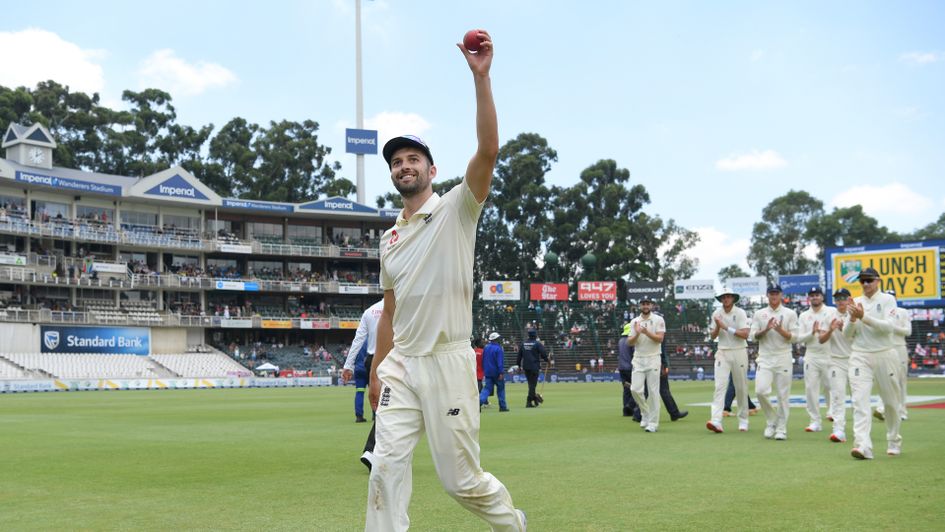International cricket returns on Wednesday as England begin their three-match Test series against the West Indies in Southampton - Richard Mann discusses the key talking points.
Cricket braces itself for new normal
Cricket is back, but it won’t be quite as we remember.
While it might not universally be the case, Test cricket in England is consistently well supported, but the stands at the Ageas Bowl in the coming days will be empty. There will be no Barmy Army singing from start to finish and the marking of a milestone, be it a hundred or a five-wicket haul, will not be to thousands of standing, adoring fans, but to only a handful of teammates. The 'new normal', cricket style.
The sight of James Anderson sanitising his hands on the boundary in last week’s intra-squad warm-up match caused something of a stir on social media but we can expect more of the same in the coming weeks and months, while the sporting of headbands appears here to stay for a good while yet.

Seeing opposition players shake hands at the end of a hard day's play or conclusion of a close Test match is all part of the beauty of our game: play hard on the field, but come together off it. For now at least, that too will be lost, as will be much of the access media outlets such as Sky Sports are able to get with the players and coaching staff to deliver the special insight that television viewers have become so accustomed to.
There are so many other measures and drawbacks that the players will have to deal with this summer in order to allow the game to return but most crucially, it is the absence of the crowd that will leave the biggest hole.
Atmosphere makes sport and as we have seen with the earlier returns of racing, football and snooker, crowds have been badly missed over the past few weeks.
Royal Ascot, for all it was a significant achievement to stage the meeting at all, wasn’t the same this year without the usual razzamatazz and the sight of Derby emphatic winner Serpentine returning to an almost empty winners’ enclosure at Epsom on Saturday was a slightly deflating one.
Empty football stands have left impressive stadia feeling soulless, and watching snooker without the inevitable ‘oohs and ahs’ from the crowd has no doubt detracted from a game that relies so heavily on atmosphere, the almost claustrophobic feeling some players experience when entering the pressure cooker of a venue like the Crucible Theatre only adding to the drama of a sport that thrives on it.
If the wicket is flat in Southampton and the West Indies batsmen happen to build a big partnership, there will be no Barmy Army singing Anderson’s name this time, or a chorus of clapping as Stuart Broad turns at the top of his mark before breaking into his run-up; legs pumping faster and harder with every clap.
Will Broad be able to recapture those hot spells that have made him such a wonderful, streaky bowler when getting on a roll; an irresistible force who once getting a sniff, who has so often proven unstoppable for bursts of mesmerising cricket?
Broad, like so many other great fast bowlers, feeds off the crowd to produce his best and home or away, he has invariably found a way to work it to his advantage.
When Jofra Archer felled Steve Smith with a brutal bouncer at Lord’s last summer, the packed crowd and those watching at home were on the edge of their seats; Archer regular topping 90mph as a previously unbreachable Smith was left hopping, bruised and genuinely rattled.
It was one of the best passages of play imaginable, made by two fine cricketers at the peak of their powers in front an engrossed crowd who rode the emotion of every delivery. Great theatre at one of the most special of cricket venues but without that crowd; no cheering, no clapping, that void of atmosphere, there is no theatre.
Players will do what they can; whether it be to fire themselves up in an attempt to get into the battle, focus on themselves and the importance of playing for personal pride and job security, or even hone in a dislike of a member of the opposition.
Still, it can’t be the same while the usually packed stands remain empty, and for players and cricket lovers alike, the new normal is going to take plenty of getting used to.
Denly dilemma
Batting at number three in England is no easy task and the fact that current incumbent Joe Denly is a shoo-in at first drop for the opening Test against the West Indies despite averaging only 30.00 in his 14 Tests to date – with no hundreds – says everything about just what a tough gig it is.
Gone are the days of Jonathan Trott feverishly marking his guard with his worn-out spikes, adjusting the peak of his helmet before driving opposition bowlers insane with his trademark shuffle across the stumps and whip through the leg side that helped establish him as the rock of England’s batting order in the all-conquering Andrew Strauss era.
Michael Vaughan before Trott wasn’t anything like as extreme with his mannerisms but if you saw him bat at his peak in the early 2000s you wouldn’t forget him, and how England have missed his rare mix of gritty Yorkshire defence and natural flair that allowed him to transfer pressure onto the opposition when the situation required it.
Plenty to have tried to fill the big shoes left behind by the likes of Trott and Vaughan but while Gary Ballance's strong numbers – particularly in the early part of his England career – suggested he might be the man for the job, it is Denly who has looked the best fit since at number three since Trott’s retirement.

Ballance always appeared better suited to number four or five and Australia – Josh Hazlewood and Mitchell Johnson in particular – were able to pick holes in a technique that has served him so well for a number years but did leave him exposed against some brilliant pace bowlers.
That’s not a criticism of Ballance; I’ve watched him close up in practice for Yorkshire and he is seriously good batsman, a player I have no doubt could still enjoy a successful international career if asked to step back into England’s middle order.
But therein lies the problem for the likes of Ballance, Denly and now even Jonny Bairstow. With Joe Root and Ben Stokes locked in at numbers four and five respectively, Ollie Pope blossoming at six, and Jos Buttler currently entrusted with the gloves at number seven, three really is the magic number.
Bairstow’s own technical deficiencies would suggest his route back into side might only come if Buttler’s own shortage of runs continues or if Pope is moved up the order to allow the Yorkshireman to slot back in at number six.
For now, Denly is the man in possession and while his detractors remain and that elusive first Test match hundred still evades him, it is hard to argue that he has done anything but a manful job in the face of some impressive pace attacks since his debut in the Caribbean in early 2019.
Kemar Roach and co provided Denly with a stern initiation and having learned plenty from that first taste of Test cricket, he grew in stature in last summer’s Ashes with his stubborn half-century in the second innings at Headingley paving the way for the Stokes show the following afternoon, before adding a classy 94 in the fifth Test victory at The Oval.
It was more of the same in South Africa as Denly stood up to the likes of Kasigo Rabada and Vernon Philander and finished the series averaging 30.00 - a mirror image of his overall Test average. Once again, he looked assured at the crease as he dutifully provided the stubborn, obdurate starts that the England management have asked of him in order to protect the explosive middle order from the new ball and fresh fast bowlers.

In terms of doing his job for the team, Denly is carrying out his role as requested but while lots of starts and the ability to eat up deliveries might earn him the respect of the dressing room, it won’t stop the critics highlighting his relatively modest numbers and lack of big, match-winning contributions.
The postponement of the away series in Sri Lanka back in the spring might have done Denly a favour in the long term, given his apparent inability to rotate the strike against spin, and up against a seam-heavy West Indies seam attack that, Roach apart, doesn’t boast anything like the artillery or skill Australia’s own attack could last summer, the Kent man will know the time to seize his chance and cement his place in the side is now.
Denly certainly looks the part with a compact defence, a free-flowing cover drive when he allows himself to use it, and apparently unflappable temperament. What he needs now is big runs, and a hundred in Southampton would be the perfect way to show Root and coach Chris Silverwood that he is their man when it comes to filling the troublesome number three spot.
Pace aces jockey for position
When England were overpowered by Australia in the 2017/2018 Ashes series Down Under, the biggest charge laid at the team and its management was the lack of genuine pace in the ranks to support James Anderson, who performed excellently throughout that winter without the support or firepower to trouble the home batsmen for long periods on some flat services devoid of any live grass.
Mark Wood was around the squad at that time but another lengthy rehabilitation following injury meant he wasn’t seriously considered for selection while across in Tasmania, a fresh-faced Jofra Archer wasn’t even eligible for England as he dazzled in the Big Bash for the Hobart Hurricanes.
Less than two years on, Wood is fully fit and chomping at the leash to make up for lost time having blown away South Africa in Johannesburg as recently as January. The West Indies won’t have forgotten the mayhem he caused when ripping through their batting line-up with a lightning spell of quick bowling in Saint Lucia the previous winter while Bridgetown-born Archer will be another familiar face to the tourists.

Archer introduced himself to English cricket fans last year in a debut summer to match anything to have gone before him. It began with a fearsome bouncer to Hashim Amla in the World Cup opener and would end with Archer taking to Test cricket like a duck to water as his ongoing battle with Steve Smith lit up the Ashes summer.
If England have been craving pace, in Wood and Archer they now have it in abundance and with Stuart Broad fresh off the back of a resurgent last 12 months and Anderson – his body willing – still bowling with a peerless level of skill and expertise, Silverwood has every right to look forward with optimism.
Throw the likes of Chris Woakes into the mix, along with a whole host of emerging bowling talent, selection for the first Test in Southampton could prove a real headache for the England think tank.
Having proven his fitness once again, Anderson remains England’s attack leader and number one bowler and ought to be the second name on the team sheet after stand-in captain Ben Stokes.
Broad, too, would think his outstanding record and strong last 12 months will put him ahead of Wood and Archer but thereafter, things get a little bit tricky.
Stokes will fill the fourth seamer spot, alongside spinner Dom Bess, but the competition to fill the third seamer role is fierce.
Having fully recovered from an elbow injury and bowled quickly in the recent intra-squad warm-up match, Archer will be hopeful of selection but Wood was arguably even more impressive at the Ageas Bowl and he was brilliant when last sighted in South Africa.

Given the schedule for this series, and England’s desire to protect the likes of Wood and Archer, and even Anderson, there should be enough opportunities over the next few weeks to keep most of the fast-bowling cartel happy. However, following an extended period of inactivity and ahead of a Test match that will signal the return of international cricket following the coronavirus pandemic, no one will want to miss out in Southampton.
Keeping the likes of Wood and Archer fit, healthy and happy, will be key to England’s hopes of long-term success in this form of the game, particularly with the next Ashes series in Australia in mind, but Anderson and Broad are far from spent forces who remain invaluable assets to their country and very fine bowlers to boot.
Managing them well, while also nurturing the likes of Woakes, Sam Curran, Saqib Mahmood and Ollie Stone, could go a long way to deciding England's fate in the next couple of years - and possibly even the 2021/2022 Ashes series itself.
Responsible gambling
We are committed in our support of responsible gambling. Recommended bets are advised to over-18s and we strongly encourage readers to wager only what they can afford to lose.Sky Bet's responsible gambling tools are detailed here and if you are concerned about your gambling, please call the National Gambling Helpline on 0808 8020 133, or visit begambleaware.org.Further support and information can be found at GamCare and gamblingtherapy.org.







